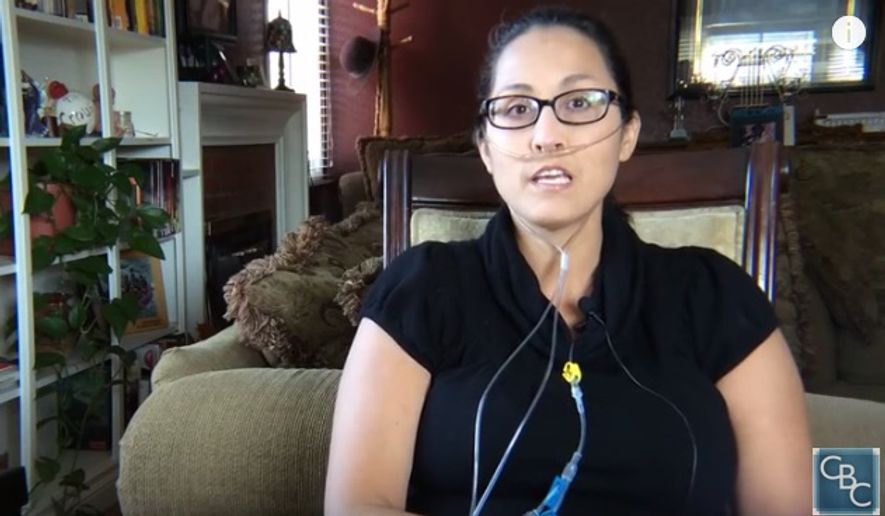A terminally ill California woman says her insurance company denied her coverage for chemotherapy treatment but offered to pay for her to kill herself, shortly after California passed a law permitting physician-assisted suicide.
Stephanie Packer, a wife and mother of four who was diagnosed with a terminal form of scleroderma, said her insurance company initially indicated it would pay for her to switch to a different chemotherapy drug at the recommendation of her doctors.
“For a while, five months or so, we’ve been trying to get me on a different chemotherapy drug for the infusions, because my doctor felt that it would be less toxic than some of the other drugs that we were going to be using,” Ms. Packer said in a video distributed by The Center for Bioethics and Culture Network on Monday.
“And I was going back and forth, and finally I had heard back from them, and they said, ‘Yes, we’re going to get it covered, we just have to fix a couple of things,’” she continued.
But shortly after California’s End of Life Option Act, which authorizes physicians to diagnose a life-ending dose of medication to patients with a prognosis of six months or less to live, went into effect, Ms. Packer’s insurance company had a change of heart.
“And when the law was passed, it was a week later I received a letter in the mail saying they were going to deny coverage for the chemotherapy that we were asking for,” Ms. Packer said.
She said she called her insurance company to find out why her coverage had been denied. On the call, she also asked whether suicide pills were covered under her plan.
“And she says, ‘Yes, we do provide that to our patients, and you would only have to pay $1.20 for the medication,’” Ms. Packer said.
Ms. Packer said her doctors have appealed the insurance company’s decision twice, to no avail. She said the assisted-suicide law creates an incentive for insurance companies to deny terminally ill patients coverage.
“As soon as this law was passed — and you see it everywhere when these laws are passed — patients fighting for a longer life end up getting denied treatment, because this will always be the cheapest option,” she said.
Her story comes as the D.C. Council considers permitting physician-assisted suicide. Modeled on Oregon’s Death With Dignity Act, the District’s legislation would allow terminally ill patients to self-administer life-ending drugs at home.
The “Death With Dignity Act” will go before the D.C. Council for a final vote on Nov. 1.
After the right-to-die movement began garnering national attention, Ms. Packer said she noticed a change in tone at her support groups for terminally ill patients. While the meetings were formerly positive and encouraging, she said the specter of suicide now hangs above them like a dark cloud.
“And people, once they became depressed, it became negative, and it started consuming people,” she said in the video. “And then they said, ‘You know what? I wish I could just end it.’”
Ms. Packer said her children motivate her to fight her illness.
“I want to live for my kids,” she said. “I want them to see that dying is a part of life. Your end of life can be that opportunity to appreciate things that you didn’t appreciate before, to say things that you didn’t say before.”
• Bradford Richardson can be reached at brichardson@washingtontimes.com.




Please read our comment policy before commenting.